| Listing 1 - 10 of 10 |
Sort by
|
Book
ISBN: 9780199580033 0199580030 0191869732 Year: 2017 Publisher: Oxford Oxford University Press
Abstract | Keywords | Export | Availability | Bookmark
 Loading...
Loading...Choose an application
- Reference Manager
- EndNote
- RefWorks (Direct export to RefWorks)
Volume 1 explores the long period between the origins of printing in late fifteenth-century England and the establishment of the novel as a recognized, reputable genre in the mid eighteenth century. Later chapters in the volume provide original, authoritative accounts of innovations by the major canonical authors, notably Defoe, Richardson, and Fielding, who have traditionally been seen as pioneering 'the rise of the novel', in Ian Watt's famous phrase. With its extended chronological and geographical range, however, the volume also contextualizes these eighteenth-century developments in revelatory new ways, to provide a fresh, bold, and comprehensive account of the richness and variety of fictional traditions as they developed over two and a half centuries.
Englisch. --- Prosa. --- Geschichte 1470-1750. --- Fiction --- English literature --- anno 1500-1799 --- anno 1400-1499
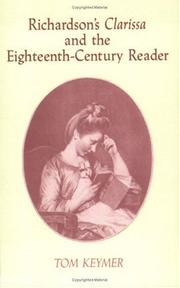
ISBN: 0521604400 0521390230 1139085999 0511553498 Year: 2004 Publisher: Cambridge Cambridge University press
Abstract | Keywords | Export | Availability | Bookmark
 Loading...
Loading...Choose an application
- Reference Manager
- EndNote
- RefWorks (Direct export to RefWorks)
Written as a collection of letters in which very different accounts of the action are unsupervised by sustained authorial comment, Richardson's novel Clarissa offers an extreme example of the capacity of narrative to give the reader final responsibility for resolving or construing meaning. It is paradoxical then that its author was a writer committed to avowedly didactic goals. Tom Keymer counters the tendency of recent critics to suggest that Clarissa's textual indeterminacy defeats these goals by arguing that Richardson pursues subtler and more generous means of educating his readers by making them 'if not Authors, Carvers' of the text. Discussing Richardson's use of the epistolary form throughout his career, Keymer goes on to focus in detail on the three instalments in which Clarissa was first published, drawing on the documented responses of its first readers to illuminate his technique as a writer and set the novel in its contemporary ethical, political and ideological context.
820 "17" RICHARDSON, SAMUEL --- 820-6 --- 82:396 --- 82.085.43 --- 028 --- Authors and readers --- -Reader-response criticism --- Books and reading --- -Epistolary fiction, English --- -Women and literature --- -Literature --- Appraisal of books --- Books --- Choice of books --- Evaluation of literature --- Literature --- Reading, Choice of --- Reading and books --- Reading habits --- Reading public --- Reading --- Reading interests --- Reading promotion --- Reader-oriented criticism --- Reception aesthetics --- Criticism --- Readers and authors --- Authorship --- 028 Lezen. Lectuur --- Lezen. Lectuur --- 82.085.43 Literaire receptie --- Literaire receptie --- 82:396 Literatuur en feminisme --- Literatuur en feminisme --- 820-6 Engelse literatuur: brief --- Engelse literatuur: brief --- English epistolary fiction --- English fiction --- 820 "17" RICHARDSON, SAMUEL Engelse literatuur--18e eeuw. Periode 1700-1799--RICHARDSON, SAMUEL --- Engelse literatuur--18e eeuw. Periode 1700-1799--RICHARDSON, SAMUEL --- History --- -History --- -History and criticism --- -Appraisal --- Evaluation --- Richardson, Samuel --- Richardson, S. --- -Reader-oriented criticism --- -English fiction --- -English epistolary fiction --- Arts and Humanities --- Women and literature --- Epistolary fiction, English --- Rape victims in literature. --- Reader-response criticism. --- History and criticism. --- Richardson, Samuel, --- Rape victims in literature --- Reader-response criticism --- History and criticism --- Appraisal --- -Richardson, Samuel
Book
ISBN: 9780198861904 Year: 2020 Publisher: Oxford : Oxford University Press,
Abstract | Keywords | Export | Availability | Bookmark
 Loading...
Loading...Choose an application
- Reference Manager
- EndNote
- RefWorks (Direct export to RefWorks)
"It is a truth universally acknowledged, that a single man in possession of a good fortune, must be in want of a wife." So runs one of the most famous opening lines in English literature. Setting the scene in 'Pride and Prejudice', it deftly introduces the novel's core themes of marriage, money, and social convention, themes that continue to resonate with readers over 200 years later. Jane Austen wrote six of the best-loved novels in the English language, as well as a smaller corpus of unpublished works. Her books pioneered new techniques for representing voices, minds, and hearts in narrative prose, and, despite some accusations of a blinkered domestic and romantic focus, they represent the world of their characters with unsparing clarity. Here, Tom Keymer explores the major themes throughout Austen's novels, setting them in the literary, social, and political backgrounds from which they emerge, and showing how they engage with social tensions in an era dominated by the French Revolution and the Napoleonic Wars. The Jane Austen who emerges is a writer shaped by the literary experiments and socio-political debates of her time, increasingly drawn to a fundamentally conservative vision of social harmony, yet forever complicating this vision through her disruptive ironies and satirical energy.
Art appreciation. --- Gesellschaft. --- Influence (Literary, artistic, etc.). --- Politik. --- Werk. --- Austen, Jane, --- Austen, Jane, --- Austen, Jane, --- Austen, Jane, --- Austen, Jane, --- Austen, Jane, --- Appreciation --- History. --- Criticism and interpretation --- History. --- Criticism and interpretation. --- Influence.
Book
ISBN: 9780198744498 Year: 2019 Publisher: Oxford Oxford University Press
Abstract | Keywords | Export | Availability | Bookmark
 Loading...
Loading...Choose an application
- Reference Manager
- EndNote
- RefWorks (Direct export to RefWorks)
Thematology --- English literature --- anno 1600-1699 --- anno 1700-1799 --- anno 1800-1899
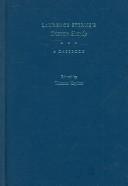
ISBN: 0195175603 Year: 2006 Publisher: Oxford ; New York Oxford University Press
Abstract | Keywords | Export | Availability | Bookmark
 Loading...
Loading...Choose an application
- Reference Manager
- EndNote
- RefWorks (Direct export to RefWorks)
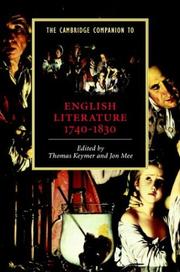
ISBN: 0521809746 0521007577 0511999240 1139816691 9780521809740 9780521007573 9780511999246 Year: 2004 Publisher: Cambridge Cambridge University Press
Abstract | Keywords | Export | Availability | Bookmark
 Loading...
Loading...Choose an application
- Reference Manager
- EndNote
- RefWorks (Direct export to RefWorks)
This 2004 volume offers an introduction to British literature that challenges the traditional divide between eighteenth-century and Romantic studies. Contributors explore the development of literary genres and modes through a period of rapid change. They show how literature was shaped by historical factors including the development of the book trade, the rise of literary criticism and the expansion of commercial society and empire. The first part of the volume focuses on broad themes including taste and aesthetics, national identity and empire, and key cultural trends such as sensibility and the gothic. The second part pays close attention to the work of individual writers including Sterne, Blake, Barbauld and Austen, and to the role of literary schools such as the Lake and Cockney schools. The wide scope of the collection, juxtaposing canonical authors with those now gaining new attention from scholars, makes it essential reading for students of eighteenth-century literature and Romanticism.
English literature --- Littérature anglaise --- History and criticism --- Handbooks, manuals, etc. --- Histoire et critique --- Guides, manuels, etc. --- 19e siècle --- Littérature anglaise --- 19e siècle --- English --- English Literature --- Languages & Literatures --- British literature --- Inklings (Group of writers) --- Nonsense Club (Group of writers) --- Order of the Fancy (Group of writers) --- 820 "17" --- 820 "17" Engelse literatuur--18e eeuw. Periode 1700-1799 --- Engelse literatuur--18e eeuw. Periode 1700-1799 --- anno 1700-1799 --- anno 1800-1899
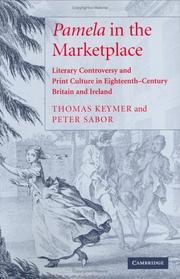
ISBN: 0521813379 9780521813372 Year: 2005 Publisher: Cambridge Cambridge university press
Abstract | Keywords | Export | Availability | Bookmark
 Loading...
Loading...Choose an application
- Reference Manager
- EndNote
- RefWorks (Direct export to RefWorks)
Samuel Richardson's Pamela (1740) is often regarded as the first true novel in English and a landmark in literary history. As the best selling novel of its time, it provoked a swarm of responses: panegyrics and critiques, parodies and burlesques, piracies and sequels, comedies and operas. The controversy it inspired has become a standard point of reference in studies of the rise of the novel, the history of the book and the emergence of consumer culture. In the first book-length study of the Pamela controversy since 1960, Thomas Keymer and Peter Sabor offer an original definitive account of the novel's enormous cultural impact.
820 "17" RICHARDSON, SAMUEL
---
094.1 <41>
---
655.4 <41>
---
Engelse literatuur--18e eeuw. Periode 1700-1799--RICHARDSON, SAMUEL
---
Oude drukken: bibliografie--
Book
ISBN: 1282346644 9786612346644 019156818X 9780191568183 019922997X 9780199229970 9780199229970 0191607843 0191956309 Year: 2009 Publisher: Oxford New York Oxford University Press
Abstract | Keywords | Export | Availability | Bookmark
 Loading...
Loading...Choose an application
- Reference Manager
- EndNote
- RefWorks (Direct export to RefWorks)
What then is to be done? said Rasselas; the more we inquire, the less we can resolve.'Rasselas and his companions escape the pleasures of the 'happy valley' in order to make their 'choice of life'. By witnessing the misfortunes and miseries of others they may come to understand the nature of happiness, and value it more highly. Their travels and enquiries raise important practical and philosophical questions concerning many aspects of the human condition, including the business of a poet, the stability of reason, the immortality of the soul, and how to find contentment. Johnson's adaptation of
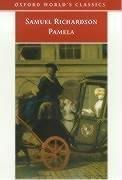
ISBN: 0192829602 Year: 2001 Publisher: Oxford Oxford University Press
Abstract | Keywords | Export | Availability | Bookmark
 Loading...
Loading...Choose an application
- Reference Manager
- EndNote
- RefWorks (Direct export to RefWorks)
Periodical
Year: 2011 Publisher: Cambridge [etc.] Cambridge University Press
Abstract | Keywords | Export | Availability | Bookmark
 Loading...
Loading...Choose an application
- Reference Manager
- EndNote
- RefWorks (Direct export to RefWorks)
| Listing 1 - 10 of 10 |
Sort by
|

 Search
Search Feedback
Feedback About UniCat
About UniCat  Help
Help News
News